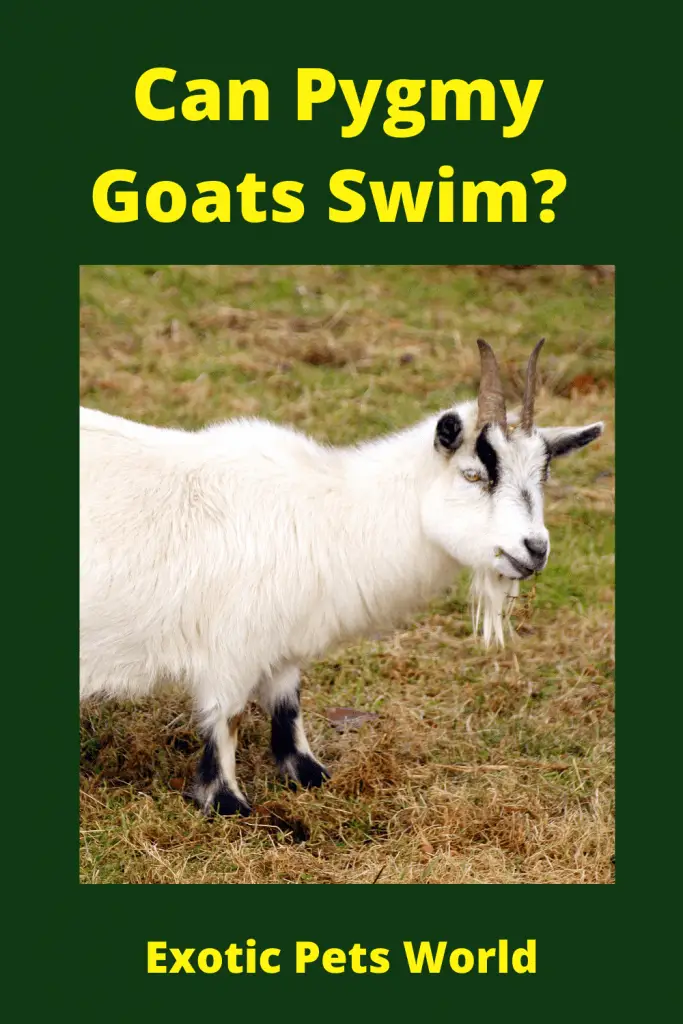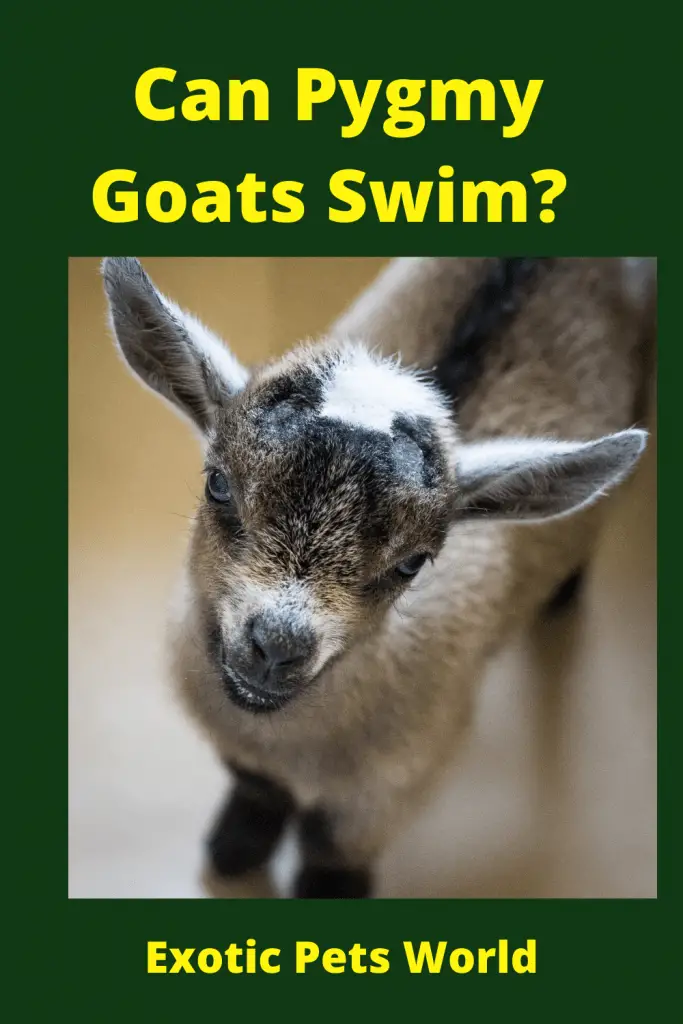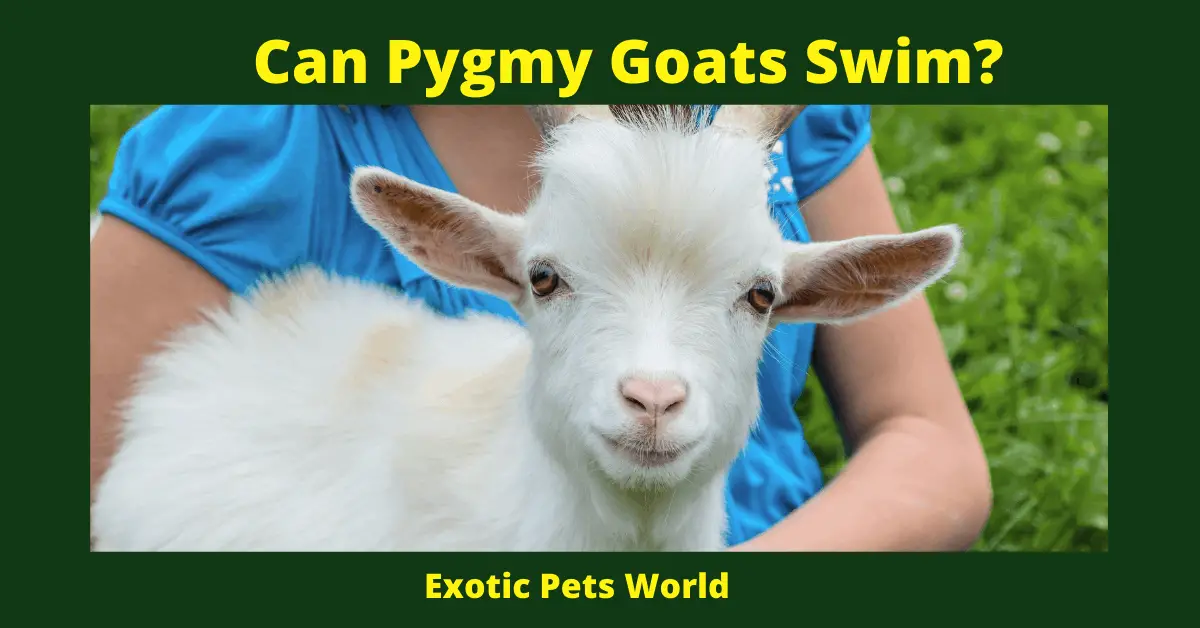As a General Rule Goats are great reluctant swimmers. They swim only when necessary for them under certain conditions such as harsh environment, in search for Food, to Breed, Their swimming would best be described as a “Doggy Paddle” They even have a history of crossing seas to populate on close neighboring islands.
Can Pygmy Goats Swim? Who doesn’t love Pygmy goats? If you’ve ever seen a baby goat a Pygmy or a Nigerian dwarf goat? you’d know that they are one of the cutest four-legged animals alive. But there is a lot more to Pygmy goats than you may think. They are fashionable, hilarious, and smart.
Goats aren’t just adorable and amusing; they’re brilliant and complex animals with multiple behavioral quirks. There are many questions people usually asked about goats, such as can Pygmy goats swim? What should you do if you find your Pygmy goat stuck in a stock tank? And what are Pygmy goat health issues? Etc.
Can Pygmy Goats Swim?
There is the one-word answer, “Yes.” Goats are great swimmers. But they never choose swimming as a habit or fun. They swim only when necessary for them under certain conditions such as harsh environment, slip from the mountain and fell in water or trying to reach food while crossing small ponds, etc.
How Efficiently can Pygmy Goats Swim?
The answer is that they’re great swimmers and have been known to swim long distances if required. They even have a history of crossing seas to populate on close neighboring islands.
While Pygmy goats can “doggy” paddle, they won’t usually choose swimming as their own will. They only swim when swimming is the only option. Swimming for a long time requires muscle training and endurance, and most of our Pygmies don’t need to swim across the water to obtain feed or shelter.

Can all Four-legged Animals Swim?
People mostly assume that all four-legged animals/mammals can usually swim. But that’s not true. Two four-legged animals cannot swim. They are
- Giraffes
- Apes
Origin and History of Pygmy Goats
The pygmies are an American breed of achondroplastic goats. It is compact, small, and stockily built. Like the Nigerian dwarf, its roots go backs to the West African dwarf group of West Africa. From 1940 to 1960, this type of animal was imported into the United States for zoos and research; some were later kept as companion animals and others as farming.
This species of goat gains the title of the separate breed in 1975. It can also be known as an African pygmy or a pygmy. This is an entirely different and distinct breed from the British Pygmy breed. If you have seen a goat, these are precious.

Breed Characteristics / Pygmy Goats
A full coat of medium to long, straight hair that varies in density with climates and seasons. On females, beards may be sparse, non-existent, or trimmed. On adult Pygmy males, abundant hair growth is compulsory; the beard should be long, full, and flowing/
They have been bred for Dairy Goats.
The American Pygmy is stocky and small with a weighty bone confirmation. Their height at the withers is usually in the range of 45 to 50 cm (17.5 to 20 in), with weights of 27 to 40 kg (56 to 87 lb).
All body colors are acceptable, and the predominant coloration is an agouti pattern or grizzled. But as a standard, more than seven color variations are recognized in the breed standard:
- caramel with black markings
- brown agouti
- caramel with brown markings
- black agouti
- grey agouti
- black with white markings
- solid black.
Breed-specific markings are present on the forehead, muzzle, eyes, and ears accented in tones lighter than the other dark portion of the body in pygmy goats of all colors, except completely black pygmies.
All hoofs are darker than the main body coat, as are the dorsal stripe, crown, and martingale, except in solid black goats. On all caramel goats, light vertical lines on the front sides of darker socks are required.
Pygmies are polyestrous, prolific, and precocious. Their kids may become sexually mature at two-three months. Gestation lasts usually lasts 5 months(+/-) 5 days.

Personality: Pygmy Goats
A great general-purpose goat for small farms, a pygmy goat is a small, friendly, and exciting breed that can be a great pet. Despite their small size, pygmies can produce 1 or 2 quarts of milk a day. Their milk is of exceptional quality and price. Because they are no more than small dogs in size, these goats need minimal care and shelter.
Their good nature and small size make them the best dairy goats, and they require less space and feeding than normal goats and are suitable for small farms in urban and suburban environments.
They are often kept as pets just for the pleasure of companionship. They have good forage eaters, which makes their milk very nutritious and delicious. Their milk contains a considerable amount of healthy fat, which is why their milk is preferred for making creams, soaps, and other high-fat goat’s milk products.
Pygmy goats are relatively friendly and easy to tame, so they can be taken out to eat: shrubs, grass, weeds, herbs, and leaves. They are easy to raise as compared to other goats. Pygmy goats are active and entertaining, and they can provide hours of fun to their owners.
Housing / Pygmy Goats
If you are looking for a four-legged pet for your garden or want more animals on your farm, pygmy goats are the ideal choice. Of course, they need special care, but it’s not hard to take care of them once you know what they need. If you give a suitable shelter, they can also live in the harshest weather conditions.

How Many Pygmy Goats Should You Keep?
Like all goats, pygmies are considered herd animals and would not be happy if left alone. If you own a pygmy goat as a pet, they will be very bored. Therefore, we highly recommend buying at least two goats. Keeping them with other goats or even dogs will meet their social needs.
The size of your pygmy shelter depends on how many goats you have. First of all, you need to provide 15 to 20 square feet for each goat and mostly do more if you get the chance because pygmies like to run and jump. However, the wire fence is the best fence for pygmies. To avoid your pygmies from jumping, the wall must be at least 5 feet high because they cannot jump higher than that.
Remember that the fence keeps pygmies safe and prevents harmful predators, especially pigs.
Are Climbing Areas Necessary for Pygmy Goats?
Pygmies are super active and entertaining, and if you built any obstacle in their pen, they could provide fun and entertainment for hours. For example, any picnic table is suitable for this. You can also make mounds out of clay. Goats also have fun with it. They also like to jump off from high places. Old worn-out tires are also great toys for your goats.
Fencing Needed
Pygmies are agile and are born jumpers. They need plenty of space to wander and exercise. So avoid extensive fencing; otherwise, they may harm themselves. However, their small size reduces the risk of causing severe damage to your fence.
Pygmy goats will stand, bend, and rub, on the wall, especially if the other side seems to have attractive food. So wire should be strong enough to withstand the pressure. Therefore, the posts should not exceed 8 feet.
As all goat owners know, goats are masterminds in escaping. Goats can get through holes, jump, climb, or crawl under fences. And pygmy goats are no exception. Also, they are more dynamic and sometimes require higher barriers
Maintaining the Health of Pygmies
Brushing your goats:
Professional suggest you brush your Pygmies goats once a day. Use a simple brush for this. Carefully clean and remove dirt from your goats. Then use a soft brush to clean your goatskin.
Note: Watch out for bumps on your goat, as this may indicate an infection, cut, or scratch.
Bathe your Pygmies:
Generally, it is not essential to bathe your goats. This is usually done if one of your goats has a parasite. Mainly, brushing is enough for your Pygmies. To clean your goat, you need to warm the water a little. Then apply soap or oat shampoo to the Pygmy goat. Use wash mitt during bathing.
After that, rinse off the soap. Bathing will be more comfortable if your goat is wearing a collar because it will make it easier for you to restrain/hold on to it.
Give them vitamin A:
Pygmy goats need vitamin A to stay healthy. They usually get vitamin A from green grass/leaves. If you don’t give any of them, provide them with corn.
Give them Vitamin D:
Like in humans, this vitamin helps goats absorb calcium, which is essential for bone health. If your goats are out most of the time, they will get vitamin D from the sun. However, if they do not spend much time in the sun, you will need to give them sun-dried grass.
Give minerals to Pygmies grazing in pastures:
If your goats are grazing only in the fields (and no grain or alfalfa is available), you can mix them with iodized salt, limestone (powdered), and animal bones (steamed and powdered). You can serve this mixture in a bucket, and the goats will eat it whenever they want.
Give selenium:
Selenium is an essential macronutrient, but it is necessary if white muscle disease is prevalent in your area because selenium protects against it. When babies are born, you should inject selenium with an injection. This condition causes the bones to turn white.
Give the vaccine annually to your Pygmies:
Your goat should be vaccinated against tetanus and enterotoxemia. You can usually buy the vaccine yourself from any feed store. This will help if you also talk to your veterinarian about getting a Rabies and Clostridium vaccine for your pygmies.
Final Thoughts
Pygmies are small beautiful goats. They can easily swim in the water if they have to. They are very playful and funny. They love their owners and love to spend time with them
